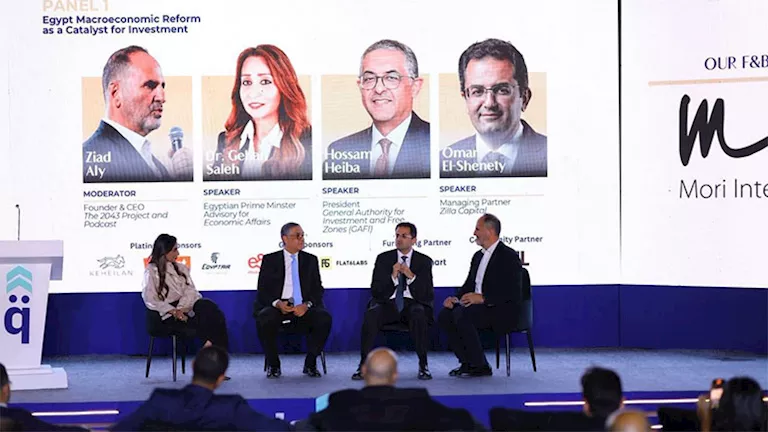Egypt is advancing a comprehensive overhaul of its investment ecosystem, aiming to transform the experience for investors from a traditionally slow and bureaucratic process into a transparent, user-friendly digital journey. Hossam Heiba, CEO of the General Authority for Investment and Free Zones, highlighted that this transformation is being driven by procedural reengineering and the introduction of a new corporate law that enables all required approvals to be completed electronically within no more than 20 days.
Heiba made these remarks during a panel discussion at the third edition of the “Egyptian Entrepreneurship Sector Annual Report 2025” summit, held in El Gouna on September 25–26. The session, titled “Macroeconomic Reforms in Egypt as a Catalyst for Investment,” explored how policy changes are accelerating sustainable growth, expanding entrepreneurial opportunities, and positioning the private sector as a key partner in national development.
According to Heiba, these reforms mark a significant shift in Egypt’s investment environment, moving beyond theoretical frameworks to tangible improvements that enhance the country’s competitiveness. By simplifying procedures, increasing clarity, and introducing flexibility, Egypt is emerging as one of the most attractive destinations for regional investment.
Dr. Gehan Saleh, Economic Advisor to the Prime Minister, emphasized that macroeconomic stability is fundamental to any reform agenda, but stressed that it must extend beyond statistical indicators to impact everyday life. She noted that real progress is measured when entrepreneurs, startups, and citizens feel the benefits in their daily operations and economic activities.
Saleh added that the deeper objective of economic reforms is to bridge the gap between high-level achievements and practical outcomes, turning stability into concrete growth opportunities and fostering inclusive, sustainable development that benefits all segments of society.
Omar Al-Shennity, founding partner at Zilla Capital, pointed out that macroeconomic stability—particularly exchange rate predictability—is crucial for restoring investor confidence in Egypt’s market. While startups and investors can navigate various challenges, he explained, prolonged uncertainty remains a major obstacle to investment decisions.
Al-Shennity noted that greater clarity on currency valuation, combined with expectations of declining interest rates, strengthens trust in the investment ecosystem. This, in turn, paves the way for increased capital inflows and unlocks the full potential of Egypt’s entrepreneurial sector, setting the stage for a new phase of recovery and expansion.
The summit, organized by In7a, is based on an evidence-driven methodology, offering a comprehensive overview of Egypt’s entrepreneurial economy. It includes multidimensional analysis of startups across sectors and regions, linking economic indicators with legal frameworks, institutional structures, and public policies.
— news from Masrawy
— News Original —
رئيس هيئة الاستثمار: إصدار قانون شركات جديد يتيح إنجاز جميع الموافقات
أكد حسام هيبة، الرئيس التنفيذي للهيئة العامة للاستثمار والمناطق الحرة، أن الهيئة تعمل حالياً على إعادة صياغة تجربة المستثمر في مصر، لتحويلها من عملية تقليدية بطيئة ومعقدة إلى تجربة رقمية متطورة تتسم بالشفافية والسهولة،
وأشار إلى أن هذه الخطوة تأتي من خلال إعادة هندسة الإجراءات وإصدار قانون شركات جديد يتيح للمستثمرين إنجاز جميع الموافقات المطلوبة إلكترونياً، في فترة زمنية لا تتجاوز 20 يوماً.
وجاء ذلك خلال مشاركته في جلسة نقاشية خلال فعاليات النسخة الثالثة من قمة “التقرير السنوى لقطاع ريادة الأعمال المصري 2025” جلسة حوارية بعنوان “الإصلاحات الاقتصادية الكلية في مصر كمحفز للاستثمار” وانعكاسات هذه الإصلاحات على دفع عجلة النمو المستدام، وزيادة فرص ريادة الأعمال، وتمكين القطاع الخاص ليكون شريكاً أساسياً في تحقيق التنمية الاقتصادية.
وأضاف هيبة أن هذه الإصلاحات تمثل نقلة نوعية في مناخ الاستثمار المصري، حيث تتحول من مجرد سياسات مكتوبة إلى واقع عملي يعزز من تنافسية مصر، ويجعلها واحدة من أكثر الوجهات جذباً للاستثمار في المنطقة بفضل سهولة الإجراءات ووضوحها ومرونتها.
وأكدت الدكتورة جيهان صالح، مستشار رئيس الوزراء للشئون الاقتصادية، أن الاستقرار الاقتصادي الكلي يمثل ركيزة أساسية لأي عملية إصلاح وتنمية، لكنه لا يجب أن يقتصر على كونه مجرد أرقام ومؤشرات على الورق.
وأضافت أن القيمة الحقيقية لهذا الاستقرار تظهر عندما يلمسه المواطنون ورواد الأعمال والشركات الناشئة في حياتهم اليومية وممارساتهم العملية.
وأوضحت صالح أن الهدف الأعمق للإصلاحات الاقتصادية هو ربط الإنجازات الكلية بالواقع العملي، بحيث يتحول الاستقرار إلى فرص ملموسة للنمو، ويقود إلى تنمية شاملة ومستدامة تعود بالنفع على جميع فئات المجتمع.
وقال عمر الشنيطي، الشريك المؤسس لشركة Zilla Capital، أن الاستقرار الاقتصادي الكلي، وفي مقدمته استقرار سعر الصرف، يمثل الركيزة الأساسية لاستعادة ثقة المستثمرين في السوق المصري.
وأضاف أن الشركات الناشئة والمستثمرين قادرون على التعامل مع التحديات المختلفة، إلا أن ما يصعب مواجهته هو حالة عدم اليقين التي تؤثر على قراراتهم الاستثمارية.
وأوضح الشنيطي أن وضوح الرؤية بشأن سعر الصرف، إلى جانب التوجه نحو خفض أسعار الفائدة، يسهم في تعزيز ثقة المنظومة الاستثمارية، ويمهد الطريق أمام تدفق رؤوس الأموال واستغلال كامل إمكانات قطاع ريادة الأعمال في مصر، بما يفتح المجال لمرحلة جديدة من التعافي والنمو.
وانطلقت بمدينة الجونة فعاليات النسخة الثالثة من قمة “تقرير تشخيص قطاع ريادة الأعمال المصري 2025″، والتي تنظمها شركة انطلاق خلال يومي 25 و26 سبتمبر الجاري.
ويستند تقرير قطاع ريادة الأعمال المصري، إلى منهج قائم على الأدلة، ليقدّم عرضاً شاملاً لواقع الاقتصاد الريادي في مصر. كما يوفر تحليلاً متعدد الأبعاد للشركات الناشئة عبر مختلف القطاعات والمناطق، ويربط بين المؤشرات الاقتصادية والأطر القانونية والمؤسسية والسياسات العامة.
